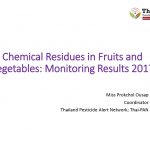
16 downloads
Title of document: Chemical Residues in Fruits and Vegetables: Monitoring Results 2017 Authors: Miss Prokchol Ousap Journal’s name if any: Ministry/Government Agency/Organisation: Thai-PAN Year of publication: 2017 Geographic focus: Thailand Main issues / topics addressed (for example: Monitoring and Result Report; ……) School of agroecology (if any): Web address to original document (if any): Summary: This presentation for Workshop on Pesticide Residues and Test Kits for Food Safety, 19 December, Phnom Penh, Cambodia Read More
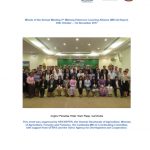
10 downloads
Title of document: Minute of the Annual Meeting 3rd Mekong Extension Learning Alliance (MELA) Report, 30th October – 1st November 2017, Cambodia Authors: HEKS/EPER Journal’s name if any: Ministry/Government Agency/Organisation: HEKS/EPER, GFRAS, Swiss Agency for Development and Cooperation, MELA, MAFF Year of publication: 2017 Geographic focus: Mekong Region Main issues / topics addressed (for example: Country presentations on new policy, innovations, challenging which are concerning to agricultural extension and rural advisory service; A panel discussion on Pesticides Impacts to Health and Environment facilitated ……) School of agroecology (if any): Web address to original document (if any): Summary: The 3rd Annual Meeting of the Mekong Extension Learning Alliance (MELA) was held from 30 October to 1st November, 2017, at Angkor Paradise Hotel in Siem Reap, Kingdom of Cambodia. It gathered participants from every country in the Mekong region MELA brings together agricultural extension and rural advisory service providers from five countries linked by the Mekong River. The Mekong River passes through Yunnan province of China and five countries in South East Asia: Myanmar, Laos, Thailand, Cambodia and Vietnam. Agricultural extension and rural advisory services in the Mekong Region have many features in common. This network was established in 2015 following discussions at the meeting held in Hanoi in 2013 on ‘Reaching the Millions’ in Hanoi. The main objectives of the MELA meeting were: to share information, knowledge, experience, and best practices in advisory services among Mekong Region countries and institutions involved in agricultural and rural development; and to provide a space for reflection, hands-on peer support and learning. This event was organised by HEKS/EPER, the General Directorate of Agriculture, Ministry of Agriculture, Forestry and Fisheries, the Cambodia MELA Coordinating Committee, with support from GFRAS and the Swiss Agency for Development and Cooperation Read More
6 downloads
Title of document: Adoption of Organic Rice for Sustainable Development in Bangladesh Authors: Shaikh Tanveer Hossain, Hideki Sugimoto, Hideto Ueno and Sheikh Mohammed Rafiul Huque Journal’s name if any: Journal of Organic Systems – Vol.2 No.2, 2007 Ministry/Government Agency/Organisation: Ehime University, JOS Year of publication: 2007 Geographic focus: Bangladesh Main issues / topics addressed (for example: Introduction; Materials and Methods; Results and Discussion; Conclusion……) School of agroecology (if any): Web address to original document (if any): Summary: Bangladesh now needs to thank its soil health, environment and human health for the country being almost self-sufficient in rice production. The present study has been undertaken to gain knowledge of the level of awareness by farmers and consumers regarding the status of organic rice, and knowledge of demand and marketing opportunities and limitations for organic rice in the country. The present study has highlighted the overall organic rice situation in Bangladesh, which is not yet well documented. The results also demonstrate that farmers and consumers are aware of the hazards of chemical compounds but have little knowledge about organic rice. The present study may open a new window for organic rice research and marketing (both local and export) for all stakeholders (including planners) and could succeed in the adoption of organic rice in Bangladesh. Read More
16 downloads
Title of document: Effect of Integrated Rice-Duck Farming on Rice Yield, Farm Productivity and Rice-Provisioning Ability of Farmers Authors: Shaikh Tanveer Hossain, Hideki Sugimoto, Gazi Jashim Uddin Ahmed, Md. Rafiqul Islam Journal’s name if any: Asian Journal of Agriculture and Development, Vol. 2, No. 1 Ministry/Government Agency/Organisation: Ehime University, Bangladesh Rice Research Institute, Bangladesh, AJAD Year of publication: Geographic focus: Bangladesh Main issues / topics addressed (for example: Introduction; Materials and Methods; Results and Discussion; Conclusion……) School of agroecology (if any): Web address to original document (if any): Summary: The feasibility of the rice-duck system of rice production, practiced in some East Asian countries, is studied in Bangladesh as a sub-project of the Poverty Elimination Through Rice Research Assistance (PETRRA). The Bangladesh Rice Research Institute (BRRI) implements the sub-project in collaboration with two NGOs, FIVDB and BDS, in the northeastern (greater Sylhet) and southern (Barisal) regions of the country. Each demonstration trial, conducted in the field of the farmers, is treated as a replication. In these trials, the rice-duck system is compared with the methods of growing rice solely, as traditionally practiced by the farmers in Bangladesh. Evaluation of the activities carried out under the PETRRA sub-project shows that the rice-duck system is not only feasible, but also economically rewarding for the farmers. The yield of rice is, on average, 20% higher in the rice-duck system than the traditional rice system (sole rice), thereby ensuring about 50% higher net return and rice-provisioning ability. The ducks in the rice-duck fields control weeds and insects very effectively; as a consequence, labor and pesticide costs for controlling weeds and insects are minimized and the soil health is improved. The ducks provide another source of added income for the farmers. In view of the favorable results obtained in the study, it might be suggested that the rice-duck system be spread throughout the country as an income-generating activity for the resource-poor farmers. Read More
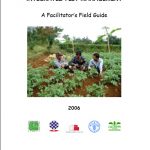
74 downloads
Title of document: Farmer Field School for Tomato Intergraded Pest Management “A Facilitator’s Field Guide” Authors: Sri Wahyuning (LPTP), Warsito Tantowijoyo (CIP), Elske van de Fliert (FAO) Journal’s name if any: Ministry/Government Agency/Organisation: LPTP, CIP, FAO, World Education Year of publication: 2006 Geographic focus: South and Southeast Asia Main issues / topics addressed (for example: Potato Crop Cultivation; Pest and Disease Management; Fertilizers; Pesticides; Harvest and Post- Harvest Management……) School of agroecology (if any): Web address to original document (if any): Summary: This guide is meant as a reference for IPM FFS facilitators. It describes exercises for the farmer field school learning process relating to sustainable potato cultivation. This learning process begins with preparing fields for planting and goes on right up to marketing harvest produce. These experiential learning exercises are intended to empower farmers to become agroecosystem managers through enhancing both their understanding of technical aspects of potato IPM and their decision making and experimental skills. This field guide with learning exercises is closely linked to the potato ecological production guide “ All about Potatoes: A Handbook to the Ecology and Integrated Management of Potato ”. Elaborations on the technical content of the learning exercises in this guide can be found in the respective chapters of the ecological production guide. Potato IPM FFS facilitators should master the contents of both guides. Read More
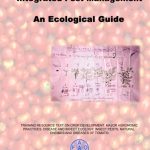
29 downloads
Title of document: Tomato-Integrated Pest Management: An Ecological Guide Authors: FAO Journal’s name if any: Ministry/Government Agency/Organisation: FAO Year of publication: 2000 Geographic focus: South and South East Asia Main issues / topics addressed (for example: Major Agronomic Practices; Ecology of Insect Pests and Natural Enemies; Major tomato Insect Pests; Major Natural Enemies of Tomato Insect Pests; Disease Ecology; Major Diseases of Tomato; Weed and Rodent Management……) School of agroecology (if any): Web address to original document (if any): Summary: This ecological guide is developed by the FAO Inter-Country Programme for IPM in vegetables in South and Southeast Asia. It is an updated version of the Tomato IPM Ecological Guide dated June 1996. The objective of this ecological guide is to provide general technical background information on tomato production, supplemented with field experiences from the National IPM programmes connected to FAOs Vegetable ICP, and from related organizations active in farmer participatory IPM. Reference is made to exercise protocols developed by Dr. J. Vos of CABI Bioscience (formerly IIBC/CAB International) for FAO. The exercises are described in Vegetable IPM Exercise book, 1998 which contains examples of practical training exercises that complement the technical background information from this guide. Read More
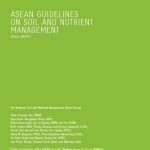
132 downloads
Title of document: Asean Guidelines “On soil and nutrient management”_Version Lao & English (Final Draft) Authors: Thandar Nyi (MMR), Varughese Philip (SGP), Mohd Izzannuddin bin Hj Bujang (BRN), Koy Ra (KHM), Budi Irianta (IDN), Pheng Sengxua and Nivong Sipaseuth (LAO), Asnita Abu Harirah and Borhan Bin Jantan (MYS), Sonia M. Salguero (PHL), Phatchayaphon Meunchang (THA), Vu Manh Quyet and Nguyen Quang Hai (VNM) and Philip Moody, Thomas Erich Jäkel, and Wannipa Soda Journal’s name if any: Ministry/Government Agency/Organisation: ASWGC and BMZ Year of publication: 2017 Geographic focus: ASEAN Region Main issues / topics addressed (for example: Soil Resources in the ASEAN region; Soil Constraints to Land Use; Good Soil Management Practices (GSMP); Standards and Regulations for Fertilizers and Supplements in the ASEAN region; Linkages between Guidelines and User Requirements; Recommendations for Future Implementation and Enhancements of the Guidelines across the ASEAN region……) School of agroecology (if any): Web address to original document (if any): Summary: Soil and nutrient management is an integrated system to manage soils, nutrients, water and crops in a sustainable manner to optimise crop production and maintain/improve soil health. These Guidelines provide regionally relevant guidance as a key component of the Strategic Plan of Action for the ASEAN Integrated Food Security (AIFS) Framework. The ultimate objective of the AIFS Framework is to achieve food security of the region by promoting adaptive and resilient ‘climate - smart’ agricultural systems that underpin a productive and profitable rural sector, while maintaining the functional capacity of the soil resource to provide essential ecosystem functions (commonly described as ‘soil health’), including mitigation of emission of greenhouse gases. Climate - smart agricultural systems are necessarily underpinned by the principles of Good Agricultural Practices (GAP), and this dependency is acknowledged in the Guidelines. These Guidelines on Soil and Nutrient Management and accompanying policy recommendations comprise advice prepared for agricultural decision makers. These decision makers may be a group or person that has the authority to make or to influence policy decisions, whether as a Minister of Agriculture and Forestry in ASEAN or in a member state of ASEAN, a member of an ASEAN Sectoral Working Group on Crops (ASWGC), a project steering committee, or an authority mandated to manage soil and nutrients in the region, including international, regional, and national bodies. The policy recommendations serve to inform how science - based evidence and recommendations on climate - resilient soil and nutrient management can assist in making the best decisions on soil and nutrient management that contribute towards sustaining agricultural production and enhancing food security. These Guidelines are intended to provide guidance to the policy, planning and technical support services of government, but the requirements of these different end - user groups are diverse. Consequently a scoping analysis was undertaken of the issues and responses of these end-user groups so the Guidelines could be framed to meet their requirements Read More
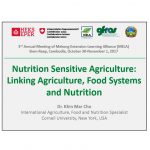
36 downloads
Title of document: Nutrition Sensitive Agriculture: Linking Agriculture, Food Systems and Nutrition Authors: Dr. Khin Mar Cho Journal’s name if any: Ministry/Government Agency/Organisation: Cornell University SDC, MELA Year of publication: 2017 Geographic focus: Mekong Region Main issues / topics addressed (for example: What’s Nutrition Sensitive Agriculture?; Nutrition Indicators; Dietary Diversity & Dietary Diversity Score (DDS); What’s Food Fortification?……) School of agroecology (if any): Web address to original document (if any): Summary: This presentation for Mekong Extension Learning Alliance 3rd MELA meeting, at Angkor Paradise Hotel, Siem Reap on 30 October – 1st November 2017, Cambodia Read More
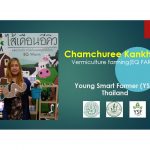
3 downloads
Title of document: Chamchuree Kankham “Vermiculture farming (EQ FARM)” Young Smart Farmer (YSF) Thailand Authors: Chamchuree Kankham Journal’s name if any: Ministry/Government Agency/Organisation: YSF Year of publication: 2017 Geographic focus: Thailand Main issues / topics addressed (for example: How it become EQ FARM; Making the different; Problem in Thailand ……) School of agroecology (if any): Web address to original document (if any): Summary: This presentation for an introduction Chamchuree Kankham “Vermiculture farming (EQ FARM)” Young Smart Farmer (YSF) Thailand. For Mekong Extension Learning Alliance 3rd MELA meeting, at Angkor Paradise Hotel, Siem Reap on 30 October – 1st November 2017, Cambodia Read More
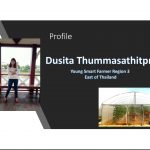
2 downloads
Title of document: Profile: Dusita Thummasathitpron “Young Smart Farmer Region 3 east of Thailand” Authors: Dusita Thummasathitpron Journal’s name if any: Ministry/Government Agency/Organisation: YSF Year of publication: 2017 Geographic focus: Thailand Main issues / topics addressed (for example: Main Product; YSF structural; YSF activity……) School of agroecology (if any): Web address to original document (if any): Summary: This presentation for an introduction “Dusita Thummasathitpron” Young Smart Farmer Region 3 East of Thailand. For Mekong Extension Learning Alliance 3rd MELA meeting, at Angkor Paradise Hotel, Siem Reap on 30 October – 1st November 2017, Cambodia Read More

 Asia & Mekong Region
Asia & Mekong Region  Cambodia
Cambodia  Laos
Laos  Myanmar
Myanmar  Other
Other  Vietnam
Vietnam